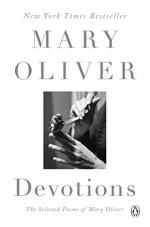|
This section contains 530 words (approx. 2 pages at 400 words per page) |

|
Devotions: The Selected Poems of Mary Oliver Summary & Study Guide Description
Devotions: The Selected Poems of Mary Oliver Summary & Study Guide includes comprehensive information and analysis to help you understand the book. This study guide contains the following sections:
This detailed literature summary also contains Quotes and a Free Quiz on Devotions: The Selected Poems of Mary Oliver by Mary Oliver.
The following version of this book was used to create the guide: Oliver, Mary. Devotions. Penguin Books, 2017.
Devotions is a book comprised of poems selected from Mary Oliver’s vast publication history. Unlike many retrospectives, however, Devotions begins with Oliver’s last book, and then stretches backwards to the beginning of her career, following a reverse-chronological order. The poems in the collection are presented with no commentary other than the fact of their selection for the collection. However, the choice of poems and the reverse-chronological order in which they appear charts the history of Oliver’s themes and ideas over the course of more than half a century.
Oliver’s poems in the opening sections of the book, beginning in her old age, contemplate the meaning of life and the way to find joy within it. The first poem presented in Devotions, from Oliver’s last original collection, Felicity, begins by asking, “Why do people keep asking to see / God’s identity papers / when the darkness opening into morning / is more than enough?” (1-4). As a thesis statement through which to begin the entire collection, it is a powerful one: the natural world, Oliver says, is proof of the divine. For the rest of the book, she presents the lessons she has learned from nature.
Subjects like these reveal much about the way Oliver sees the world, and can therefore be considered personal poems. However, the poems in these earlier sections of the book share very few details of the poet’s life. Instead, these poems deal with the question of how to live well in general, and what it means to be human. With a few notable exceptions, the poems in the first half of the book do not offer more detail about the poet’s life than the name of her dogs and the fact that she teaches poetry. Mid-way the book, however, the poem “Flare” takes on the subject of Oliver’s difficult relationship with her parents.
“I will mention them now, / I will not mention them again,” Oliver writes of her parents, after speaking in sympathetic but oblique terms about her relationship with them (70-71). The poem seems to take place at the time of Oliver’s burying her parents, and as she says in this poem, they do not appear in her work in any of the later poems which are collected earlier in the book. This poem proves to be a turning point, however, and the poems that follow it, from earlier in Oliver’s career, reveal more personal details about her life.
This shift indicates both a growing awareness in Oliver of her own rise to prominence as a poet and, with it, a greater desire for privacy. Ultimately, however, the name of the collection, Devotions, provides perhaps the most salient clue to interpreting the collection as a whole: the poems in this book are collected as an act of prayer, or as a summing up of the prayers of a lifetime. Thus, the journey from a greater focus on earthly, interpersonal concerns to the more broadly transcendent experience of existing in nature provides a roadmap for the reader.
Read more from the Study Guide
|
This section contains 530 words (approx. 2 pages at 400 words per page) |

|



